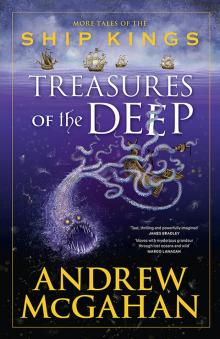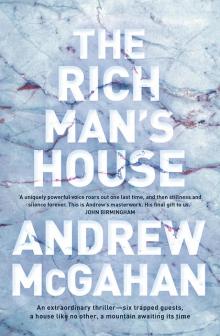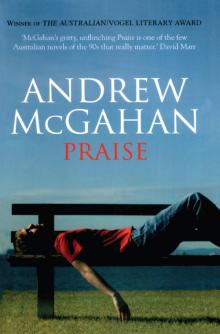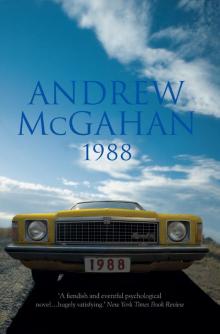- Home
- Andrew McGahan
The White Earth
The White Earth Read online
The White Earth
ANDREW
McGAHAN
The White Earth
First published in 2004
Copyright © Andrew McGahan 2004
All rights reserved. No part of this book may be reproduced or transmitted in any form or by any means, electronic or mechanical, including photocopying, recording or by any information storage and retrieval system, without prior permission in writing from the publisher. The Australian Copyright Act 1968 (the Act) allows a maximum of one chapter or 10 per cent of this book, whichever is the greater, to be photocopied by any educational institution for its educational purposes provided that the educational institution (or body that administers it) has given a remuneration notice to Copyright Agency Limited (CAL) under the Act.
Allen & Unwin
83 Alexander Street
Crows Nest NSW 2065
Australia
Phone: (61 2) 8425 0100
Fax: (61 2) 9906 2218
Email: [email protected]
Web: www.allenandunwin.com
National Library of Australia
Cataloguing-in-Publication entry:
McGahan,
Andrew. The white earth.
ISBN 1 74114 147 8.
1. Inheritance and succession – Fiction. 2. Family – Fiction.
I. Title.
Set in 12/15 pt Bembo by Asset Typesetting Pty Ltd Printed by Griffin Press, South Australia
10 9 8 7 6 5 4 3 2 1
For my parents, whose life this isn’t.
This is a work of fiction. While the Darling Downs are real enough, the northern parts of the region do not exist as described here. This story is not meant to portray any actual place, person or event.
Contents
Prologue
Chapter One
Chapter Two
Chapter Three
Chapter Four
Chapter Five
Chapter Six
Chapter Seven
Chapter Eight
Chapter Nine
Chapter Ten
Chapter Eleven
Chapter Twelve
Chapter Thirteen
Chapter Fourteen
Chapter Fifteen
Chapter Sixteen
Chapter Seventeen
Chapter Eighteen
Chapter Nineteen
Chapter Twenty
Chapter Twenty-one
Chapter Twenty-two
Chapter Twenty-three
Chapter Twenty-four
Chapter Twenty-five
Chapter Twenty-six
Chapter Twenty-seven
Chapter Twenty-eight
Chapter Twenty-nine
Chapter Thirty
Chapter Thirty-one
Chapter Thirty-two
Chapter Thirty-three
Chapter Thirty-four
Chapter Thirty-five
Chapter Thirty-six
Chapter Thirty-seven
Chapter Thirty-eight
Chapter Thirty-nine
Chapter Forty
Chapter Forty-one
Chapter Forty-two
Chapter Forty-three
Chapter Forty-four
Chapter Forty-five
Epilogue
Acknowledgments
Prologue
ONE SPRING DAY IN LATE 1992, WHEN WILLIAM WAS HALFWAY between his eighth birthday and his ninth, he looked out from the back verandah and saw, huge in the sky, the mushroom cloud of a nuclear explosion. He stared at it, wondering. The thunderhead was dirty black, streaked with billows of grey. It rolled and boiled as it climbed into the clear blue day, casting a vast shadow upon the hills beyond. But there was no sound, no rumble of an explosion. Hot silence lay across the wheat fields, and the air was perfectly still. William said nothing, for there was no one to tell — his mother was in bed with a headache, and he knew better than to wake her. He sat on the edge of the verandah and watched. Ever expanding, the cloud began to drift, caught by some upper breeze. It loomed over the house, and great jets were arcing out from the main body, like the trails of slow meteorites. Down below, ash was beginning to fall, small black flecks spiralling in the air. Other particles were bigger, shrivelled and twisted embers, still glowing red as they settled. William was aware of the smell of burning … but it was a good smell, a familiar smell. The smell of grass, of wheat, of the farm itself.
Suddenly he heard engines. There was a dirt track that ran past the house and out across the property, and now a flatbed four-wheel drive sped by along it, trailing dust. A car followed close behind. William didn’t recognise either vehicle. This was odd. What were strangers doing on the farm? Looking out across the paddocks he saw an even more bizarre sight. A tractor — not his father’s — was bouncing across the fields, as fast as he had ever seen a tractor go. And there was yet another four-wheel drive, right out amidst the wheat where there were no tracks, cutting a straight line through the crop. The farm was alive with movement. The phone had started ringing, and from the front of the house came the noise of more cars arriving, of doors slamming, and of women yelling. William climbed to his feet, studying the cloud. It was breaking up now, thinning to a misty orange. From its base stretched a long murky stalk of smoke, leading back to the ground. It seemed to touch down somewhere at the rear of the farm, where a haze hung around a small point of darkness.
There were urgent voices in the hallway. William’s mother and two other women — he knew them, they were neighbours — dashed onto the verandah. They stopped, staring. His mother’s hand went to her mouth.
‘Oh God,’ she said,‘Will …’
And William knew that she meant his father, not himself.
It was outside all of his experience.
Only later would he understand what had happened, that the cloud was not from an atomic bomb, that indeed it couldn’t have been anywhere near as big as a real mushroom cloud, no matter how large it loomed in his memory. Instead, it was the smoke from a seventy-acre paddock of wheat — ripe and tinder dry after the hottest spring in years — going up in flames. And somewhere in the middle of that field was the harvester which had set off the blaze. A big, bright red machine. Singed black. The fireball might have been started by an electrical fault, or an overheated bearing, perhaps, igniting some chaff that had gathered under the engine casing. William would never know. But in that harvester — or near it maybe, on the ground, for William was never told this either — were the remains of its driver. A man, suffocated probably as much as he was burned. Dead, either way. There was nothing anyone could have done. Dozens of farmers from the surrounding properties had seen the smoke, and knowing instantly what it was, they’d leapt into their farm vehicles and raced directly across the plains. All of them much too late.
After it was over, they gathered in the kitchen and in the dining room. Men grimed with ash and smoke, women busy making tea, or passing out iced water and solemn glasses of beer. William drifted through them, aware that something terrible had happened, but feeling outside of himself, confused by the attention the men and women gave him, and by their compassion. He caught passages of conversation. Plans. Offers of help. Of food. Of money. The police came and went away. An ambulance came, gathered up something from the shed, and went away. All the men went away too, and most of the women, leaving only a few to cluster around his mother. The afternoon lengthened into evening. William went and stood on the back verandah, stared out over the farm. The sky was clear again, as if nothing had happened.
When evening had turned into full night there came a final visitor, an old man who walked with a limp. He stood in the doorway to the kitchen, tall and grim. The women fell silent.
‘Veronica,’ he said.
William’s m
other nodded, dazed. She looked around the room until she saw William. He moved to her side, gazing up at the stranger. The man did not smile.
His mother said,‘William, this is your uncle John.’
William had never heard of any uncle.
He slipped away and hid in his bedroom. From there he could hear the talk in the kitchen. The women’s voices mostly, but sometimes the man’s voice too. It was low and dry and, unlike the others, it held no sympathy at all.
Later his mother came in, sat on his bed.
She said, ‘I’m going to need your help from now on, Will. You’ll have to be strong.’
‘I know.’
‘Do you understand what’s happened?’
He nodded.‘I watched the fire.’
She echoed him distantly.‘You watched the fire …’ Her hands were twisted in each other. But then her gaze narrowed.‘What do you mean, you watched it?’
‘From the verandah. I saw the cloud going up.’
‘You were out there the whole time?’
He nodded again. Looked up at her.
She shuddered suddenly. Her arm lifted and she slapped him, her hand catching his right ear in a painful, piercing smack. Then she was crying. ‘Stupid boy. You just sat there and watched? Why didn’t you come and get me? Why didn’t you do something? Your father …’
And then she was gone.
William sat on his bed, his ear ringing. It was not the first time his mother had hit him and as always he knew she hadn’t meant it, forgave her for it even as it happened. It was just the way she was. But he started to cry at last, because of the pain, and because of everything else. Finally he curled up, wanting to sleep. He lay there for hours, while out across the blackened fields the shell of his father’s harvester smouldered under the stars. But the ringing in his ear wouldn’t go away.
Chapter One
IT WAS THE WINTER OF 1993,DRY AND COLD, BY THE TIME WILLIAM and his mother said goodbye to their farm. They were going to live with William’s uncle, John McIvor.
‘He’s not really your uncle,’ William’s mother warned. ‘He’s your great-uncle, on your father’s side. That means he’s not obliged to me and you at all, but he’s doing this out of the goodness of his heart. So when we get there, I want you to behave yourself.’
William understood. They were now relying on charity.
It was not an entirely new sensation, for they had always been poor. Their farm was in the middle of the Kuran Plains, a region famous for its fertile black soil, but somehow their own property had never been a success. True, the last few seasons had been bad for everyone. The rains had failed two years running. Even so, the crops on William’s farm seemed to wither or die more readily than those on surrounding properties. He had often heard his parents argue about the problem, and about money, and sometimes his mother would accuse his father of being no farmer. And maybe he wasn’t. Would a good farmer have let his harvester accumulate so much dust within its engine compartment that a fire was inevitable? And would a good farmer have allowed the insurance to lapse, not only on the harvester, the farm’s most expensive piece of equipment, but on his own life as well?
For when the ashes settled, his wife and child were destitute. The property was laden with debts, and there was no question of William’s mother carrying on alone. She didn’t work and never had — it was accepted that her health was not up to it. So the only option was to surrender the farm to the bank. William supposed that perhaps he had a right to be angry at his father for this — his mother certainly seemed to be — but he wasn’t. He wasn’t even angry at him for dying. That pillar of smoke in the sky had been too momentous a funeral pyre, too much like the hand of God in the heavens, for William to lay blame. And he had no wish to spoil the memories of his father with bitterness. Those memories were too few and too precious, the fading images of an untidy, gangling man with a lean, unshaven face and a smile that was always somehow sad.
Then there was the fateful harvester — one of William’s favourite pastimes had been to ride in it with his father, high up in the cab, staring down as the wheat surrendered to the flashing blades of the comb. It was a fascinating process, the heads disappearing in a frenzy of dust and leaves under the rolling drum, sucked inwards to the guts of the machine, which rumbled and shook mysteriously, until naked grains poured out of a spout into the bin behind the cabin, and from the rear of the harvester shot a dirty fantail of stubble and waste. William couldn’t imagine handling a machine so complex, and admired his father tremendously for doing so. There was no point in remembering that the wheat they were harvesting was always too thin, and that the harvester itself was too old, always prone to breaking down, and that the dust that would feed the fire had been gathering within the engine all the while. No point either in picturing how things must have been that day. There was so much to monitor while harvesting — the height of the blades, the level of grain in the bin, the rate and spin of a dozen different parts of the machinery — that one man could hardly keep track of everything. Maybe if William had been there in the cabin too, watching — but he wasn’t, not on that afternoon. And so his father must have missed the first curl of smoke from below, and then the flames growing hungrily…
It was no part of love to think of any of that.
William’s mother, meanwhile, had not received the grace of an early death and a martyrdom to fire, but his feelings about her had always been more complex. She was harder to love than her husband — physically harder too, a thin woman of angles and bones, with long wispy brown hair. If at his father’s core there was a crucial weakness, a life of plans made but never fulfilled, then at his mother’s core William sensed something fractured and brittle. It was never spoken about, but he had been aware from a very young age that she was delicate, in a special way. Headaches plagued her, and much of the time she was listless and exhausted. At other times she was wildly short-tempered, screaming weakly at William if he annoyed her, and stinging him with slaps. Afterwards she would lock herself in the main bedroom and weep. She took many pills, and frequently visited the doctor. On several occasions she had disappeared for up to a week. Resting, William’s father would say, at a place where people went when they needed time away by themselves.
But when William played with children on the neighbouring farms, he could see that their mothers were different. They bustled with energy, they were friendly and welcoming, they helped their children with homework, they volunteered to serve on school committees and in the canteen, they had sandwiches waiting whenever William arrived. His mother did none of these things — she was always too tired, or her head hurt, or she was hidden in her room and William was forbidden to make a sound. It made him feel secretly ashamed of her, and he felt guilty about the shame. He knew that at least part of her behaviour was explained by the simple fact that life was more difficult for them than for other families. Their farm was not as prosperous, their car was not as new, their house was not as nice, and while these things did not seem to bother his father, they made his mother unhappy.
It was their house that displeased her most. It was very small and very old, a four-room cottage, with a back verandah, and a kitchen annexe to one side. It rested on wooden stumps that were driven deep into the soil — but never deep enough, for on the plains the bedrock lay far down below, and so the stumps were forever shifting, warping the floors and the door frames. Inside, the rooms were cramped and dark, and it was hot in summer, cold in the winter. William’s father had promised that he would build them a new home one day. There was even a pile of lumber at the end of the yard, stacked up in a big square like a castle. But it had been there as long as William could remember, overgrown with weeds. His mother would harp on at his father about this, and William knew that she just wanted a nice home for them to live in, a place where she could invite people and host dinners, and not be embarrassed. Most of their neighbours had sprawling new homes made of brick, set on concrete slabs that floated upon the black soil like rafts. T
hat’s what his mother would really have loved, but his father wasn’t so sure.
‘Those slabs will crack one day,’ he’d insist.‘And then all those bricks will just crumble. A wooden house is better. It might not look like much, but this old place will never fall down.’ Then he would reach out to caress the crooked door frames fondly, the sleeves of his favourite green jumper all tattered and frayed at the elbows.
For William, the house was simply home and the centre of his world. Beyond the back door spread a bare dusty yard. His mother wanted a lawn, but his father was much more interested in one corner which he’d roped off and cultivated as a vegetable garden. Every year he planted ambitiously — tomatoes, beans, lettuces, melons, pumpkins — and yet nothing much ever seemed to grow. William’s father blamed the birds. He shot at them with an old .22 rifle, or built scarecrows, but it made no difference. He planted trees too, oranges and lemons, the fruit of which William could never remember ripening. Then there was the chicken coop, which was supposed to supply them with roast dinners and eggs for breakfast. But foxes had got in some years earlier, and now the doors swung emptily and the wire fencing gaped. William had only one recollection of his father actually slaughtering a chicken — its head jammed between two nails on an old tree stump, until the axe came down and the bloodied, headless body leapt about. But then the gutting and plucking was a chore, and after half an hour of sitting on the back step, surrounded by feathers, his father lost patience, and from then on the family’s chickens were store bought.
Beyond the coop was the farm’s ageing shed, and it was one of William’s favourite places to explore, big and dark and ramshackle, made entirely of corrugated iron. All the farm vehicles were kept within — the tractor, the harvester, the grain truck, an ancient Land Rover (army surplus from the Second World War, his father claimed) — but there was lots more. Huge workbenches loaded with all sorts of tools and engine parts. Old furniture, old cupboards, piles of old magazines and books. Mysterious blocks of metal, stacks of broken plough shares, air pumps, welding equipment, drums of oil, folded heaps of tarpaulins. All of it fitfully illuminated, for there were bullet holes in the shed’s tin walls and shafts of sunlight would angle through them, highlighting the motes of the dust in the air. And everywhere there were nesting holes for rats and mice, an endless quarry, especially at night when William hunted them with a flashlight, and the whole shed rustled and creaked with their movements, and their tiny eyes shone back at him from every corner.

 Treasures of the Deep
Treasures of the Deep The Rich Man’s House
The Rich Man’s House Praise
Praise The White Earth
The White Earth 1988
1988 The Coming of the Whirlpool
The Coming of the Whirlpool The War of the Four Isles
The War of the Four Isles The Ocean of the Dead: Ship Kings 4
The Ocean of the Dead: Ship Kings 4 Last Drinks
Last Drinks Wonders of a Godless World
Wonders of a Godless World Underground
Underground The Voyage of the Unquiet Ice
The Voyage of the Unquiet Ice